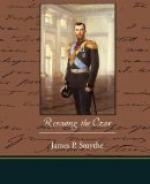Possibly the Prisoners of Tobolsk may have been willing to suffer what is termed a “technical death” in diplomatic circles in order to elude the hungry bloodhounds of the Revolution. They may have welcomed the many opportunities such an event would furnish to read their own obituary in the letters and official documents which treated of their tragic fate. Who knows? They certainly possessed a saving sense of humor or they would never have left behind them at Ekaterinburg so many little reminders of the tragic romance to which calm investigation hereafter will give birth. For instance, there are a couple of diaries that some men must have kept. Of their existence it seems certain that some of the prisoners knew. Why and just how the hitherto profound State secrets narrated in these diaries come now to light is suggested by a simple little letter that raises the inquiry, “Did the Imperial Russian family escape?”
The letter that started this investigation is little different from others one receives from friends traveling in the Orient. By itself it does not clearly identify the family it describes; but, when the scene it pictures is coupled with the events narrated in the purloined diaries which the hands of some invisible diplomats have left behind, the student of the Russian Revolution will marvel at the skill with which some other Royal hands untied the knot of Fate.
II
WHAT MAY BE READ BETWEEN THE LINES
There may be those in official circles who will suggest that a case of mistaken identity is exhibited in the following quotation from the letter. “It is in a sort of arboreal enclosure, with all sorts of flowers and vigorous vegetation that characterizes this region,” the letter reads. “Behind the ivy-covered wall that extends around the gardens and shuts out all intruders, I got a glimpse of that man through the heavy iron gate. He was smooth-shaven, slightly drooped, sprinkled with gray and with a scar upon his forehead near the roots of his hair—a little to one side. He was twirling a pruning knife in his left hand and speaking in English to a boy who scampered up to him ahead of four beautiful girls and a very dignified woman moving leisurely over the lawn in the direction of the gate.
“When the women reached the man’s side they paused for a moment and asked a few questions in Russian. He seemed to be listening very attentively and answering only in monosyllables.
“Then I noticed the elder of the women unfold a well-known London newspaper and move closer to his side. They began glancing over its pages together and seemed to be deeply moved by an article they, apparently, were reading as they walked slowly toward the gate. Finally, when they were about ten feet from where I stood concealed behind one of the massive palms, the man raised his head from the page and, looking earnestly into the woman’s eyes, exclaimed




